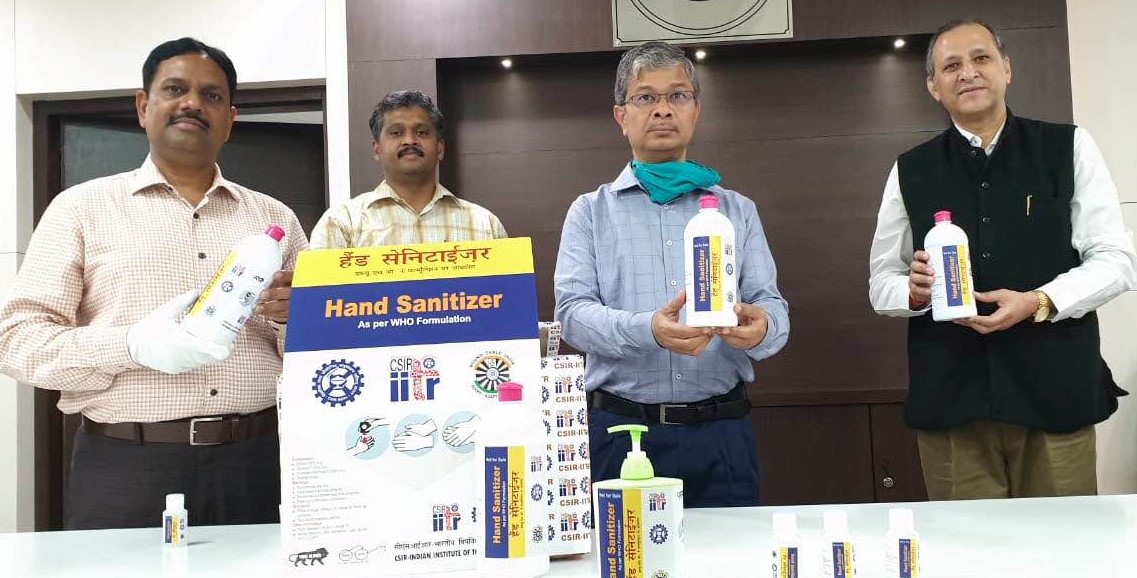Institute produces hand sanitizer to help fill coronavirus shortage
Amid lockdown many organizations and NGO’s have come forward to provide essential things like sanitizer and masks free of charge to government and needy people. Concerned about health of frontline workers who are fighting corona virus, CSIR-Indian Institute of Toxicology Research, (CSIR – IITR) Lucknow has come forward and manufactured hand sanitizer in its laboratory in Lucknow.
On request of Divisional Commissioner of Lucknow, hand sanitizer was manufactured on war footing level at IITR, which is located next door to commissioner’s office. After manufacturing hand sanitizer, it was provided to the Uttar Pradesh government in the presence of Chief minister Yogi Adityanath by Prof. Dr. Alok Dhawan, Director CSIR-IITR. Besides CM, many senior state officials were present. Later, it was also presented to Mukesh Kumar Meshram, Divisional Commissioner, Lucknow in his office.
These hand sanitizers manufactured by IITR are given free of charge to UP government. This liquid hand sanitizer would be distributed among front-line workers that includes Municipal sanitary personnel, Policemen, hospitals and others, who comes into direct contact with public in routine work of performing their duties.
Mukesh Kumar Meshram – Divisional Commissioner Lucknow Speaking to exclusively to Mumbai Messenger Newspaper said “When we realized that hand sanitizers became expensive and disappeared in local market, we requested IITR to manufacturer hand sanitizer for UP Government. The IITR has expertise to manufacture hand sanitizer as per global FDA standard. On our request, they happily agreed to it and began manufacturing. These hand sanitizers are manufactured as per the guidelines and standard of World Health Organization (WHO)”.
Meshram further elaborated “These sanitizers would be distributed to frontline team who are directly exposed to public like Safai Karmacharis, Police Personnel, hospitals and ration shops, where public would come to collect rations. As of now they have given us approximately 700 liters of hand sanitizer packed in handy plastic bottles. They would keep on supplying sanitizers to us, as and when required. We are grateful Professor Alok Dhawan and IITR for their assistance to us, as we work to keep our front fighter and inmates safe. Prof. Dhawan is very supportive and has come forward in this initiative wholeheartedly”.
Numerous attempts to contact IITR Director were futile. A senior officer from the institute on the condition of anonymity, as he is not authorized to media said “Like all health care professionals, we’re deeply concerned about the virus and want to do everything we can to help stop it’s spread. We have the expertise and the labs here to properly produce hand sanitizer as per WHO standards. So, this is one small way we can help with the monumental, ongoing response to this pandemic.”
It may be noted that Panic buying over the coronavirus pandemic has led to sanitizers flying off the shelves at chemist shops across the country. Manufacturers have not replenished the stock as demand took a sudden spike in the past couple of weeks. The government is taking all necessary steps to curb on hoardings and black marketing of sanitizers. If anyone found violating government orders, they would be dealt with as per law.
About IITR: Indian Institute of Toxicology Research IITR, Lucknow is a constituent laboratory of Council of Scientific & Industrial Research (CSIR). This multidisciplinary research institute with the motto Safety to Environment and health and service to industry addresses problems critical to human health and environment. The institute has Good Laboratory Practice (GLP) Compliance Certification from NCGMA, Government of India, issued with respect to Toxicity studies, Mutagenicity studies, Environmental toxicity studies on aquatic & terrestrial organisms, and Analytical & clinical chemistry testing. The institute also has NABL accredited facilities for Biological and Chemical testing services. It undertakes research in niche areas of toxicology. These include the impact of industrial and environmental chemicals on human health and ecosystem, and environmental monitoring of pollutants in air, water and soil.

Editor in Chief : Mewati SItaram











